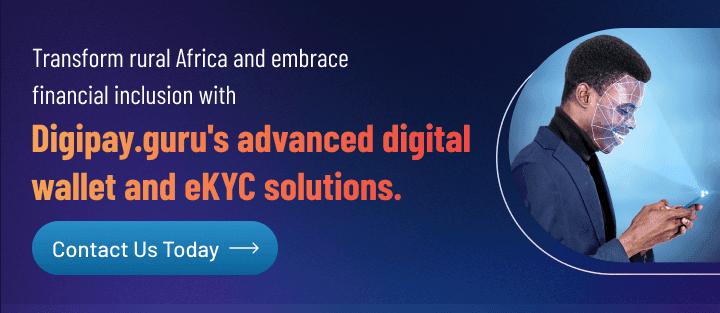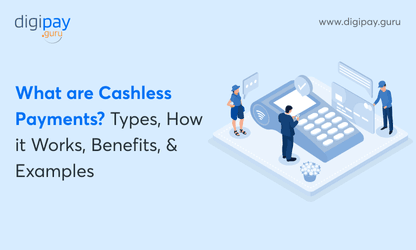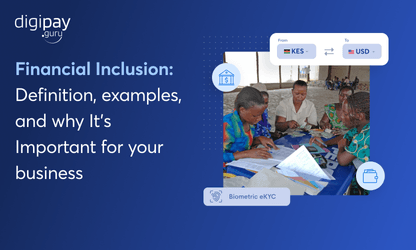Africa is a continent of remarkable diversity, from bustling cities to sprawling rural landscapes. However, one issue that affects both urban and rural areas alike is financial exclusion. In rural Africa, where the majority of the population lives, access to formal financial services is severely limited.
This lack of access to financial services in Africa, not only impedes personal economic development but also hinders overall economic growth. According to a World Bank report, only 43% of adults in sub-Saharan Africa have a bank account. While Africa’s half of population resides in rural areas, 52.24 percent precisely, there are still no proper formal financial services in most areas. These numbers paint a grim picture of financial exclusion in the continent.
The absence of formal financial services is a significant barrier to financial inclusion, especially in rural areas where the majority of the population is engaged in agriculture or informal businesses.

Without access to basic financial services like savings accounts or credit, individuals are often forced to rely on informal or unreliable means of financial support. It also affects businesses, which struggle to expand and access the capital necessary to grow and create jobs. Thus, financial exclusion has been identified as a major factor hindering economic development in rural Africa.
However, a solution to this problem is emerging in the form of electronic Know Your Customer (eKYC) technology. This technology can significantly reduce the cost of onboarding new customers and expand financial inclusion in rural areas.
In this blog post, we will discuss the state of financial inclusion in rural Africa, all about eKYC and how it helps in expanding financial inclusion, overcoming the challenges in implementing eKYC, benefits & best practices of eKYC in banking and financial inclusion along with real-life instances of its successful implementation.
Understanding Financial Inclusion in Rural Africa
Financial inclusion remains a major challenge in rural Africa, where the majority of the population lives. While access to formal financial services is critical for economic growth and poverty reduction, only a small percentage of rural residents have access to basic financial services like bank accounts, loans, and insurance.
In this section, we will discuss the state of financial inclusion in rural Africa and examine the factors that contribute to financial exclusion. We will also use statistics and case studies to illustrate the impact of financial exclusion on individuals and the economy.
The Current State of Financial Inclusion in Rural Africa
According to a World Bank report, only 43% of adults in sub-Saharan Africa have a bank account. And only 19 percent of the rural population in the African continent has financial services access. This indicates that even with a considerable evolution of financial inclusion, a significant proportion of the population lacks access to formal financial services.
Factors Contributing to Lack of Access to Formal Financial Services
Several factors contribute to the lack of access to formal financial services in rural Africa. These include:
Limited physical infrastructure
Many rural areas lack basic infrastructure like roads and electricity, which makes it difficult for financial institutions to reach potential customers.
Low levels of financial literacy
Many people in rural areas lack the knowledge and skills needed to manage their finances and access formal financial services.
High costs
For many financial institutions, serving customers in rural areas is expensive due to the high costs of establishing and maintaining a physical presence.
The Impact of Financial Exclusion on Individuals and the Economy
The lack of access to formal financial services has a significant impact on individuals and the economy as a whole. Financial exclusion can lead to:
Limited opportunities for savings and investment
Without access to formal financial services, individuals are often forced to rely on informal savings methods, which may not be secure or profitable.
Limited access to credit
Without access to credit, businesses struggle to grow and create jobs.
Increased vulnerability to shocks
In the absence of formal financial services, individuals and communities are often unable to cope with unexpected events like illnesses, crop failures, or natural disasters.
What is eKYC?
Electronic Know Your Customer (eKYC) is a technology-enabled process that allows financial institutions to verify customer identity electronically, without requiring physical documentation or in-person visits. This technology is especially important in rural areas where access to formal financial services is limited.
In this section, we will discuss the concept of eKYC and provide real-life examples of how it is being used to expand financial inclusion in various parts of the world.
eKYC: What is it?
eKYC is a process that allows financial institutions to verify customer identity electronically, without requiring physical documentation or in-person visits. This technology uses various methods such as biometric authentication, digital signatures, and artificial intelligence (AI) algorithms to verify customer identity.
How does eKYC work?
The eKYC process can be broken down into the following steps:
Customer provides personal information
The customer provides personal information, such as their name, date of birth, and address, through a digital channel.
Information is verified
The information provided by the customer is verified using third-party data sources, such as credit bureaus or government databases.
Biometric authentication
In some cases, biometric authentication may be used to further verify the customer's identity. This may involve capturing a facial image or fingerprints. One of the popular cases nowadays is biometric authentication in digital banking.
The account is opened
Once the customer's identity is verified, the account is opened, and the customer can begin using the digital fintech solutions.
The Role of eKYC in Expanding Financial Inclusion
Electronic Know Your Customer (eKYC) is a digital identity verification process that has transformed the financial industry by allowing banks and financial institutions to verify customer identity electronically, without requiring physical documentation or in-person visits.
In this section, we will explore the role of eKYC in financial inclusion, its expansion, and how it can help banks affordably serve more customers in rural areas.
The Benefits of eKYC over Traditional KYC Methods
There are several benefits of eKYC in banking over traditional KYC methods, including
Increased efficiency
eKYC eliminates the need for physical documentation and in-person visits, making the process of customer onboarding faster and more efficient.
Enhanced security
eKYC uses biometric authentication and digital signatures, reducing the risk of identity theft and fraud.
Greater accessibility
eKYC makes it easier for customers to access financial services, especially in rural areas where physical infrastructure is limited. Now there are so many merchant payment solutions available that work solely on simple eKYC processes.
How eKYC Can Help Banks Affordably Serve More Customers in Rural Areas
eKYC can help banks affordably serve more customers in rural areas by reducing the cost of onboarding new customers. In rural areas, the cost of onboarding new customers can be significant due to the lack of physical infrastructure and the need for in-person visits.
eKYC eliminates these costs by allowing customers to verify their identity electronically, reducing the need for physical documentation and in-person visits.
Examples of Successful eKYC Implementations
India
The Indian government has implemented eKYC to promote financial inclusion in the country. The government launched the Aadhaar program, which promotes various uses of e-KYC including biometric authentication to verify customer identity. India has a video form that provides numerous benefits of video KYC for banks.
The program has enabled over a billion people to access various financial services like bank accounts, insurance, and mobile payments.
Kenya
Safaricom, a mobile network operator in Kenya, has successfully implemented eKYC to enable customers to easily open bank accounts and access credit services through their mobile phones.
This is made possible by allowing customers to use their national ID and biometric information to verify their identity, eliminating the need for physical documentation or in-person visits.
Bangladesh
In Bangladesh, the central bank has launched an eKYC platform that allows customers to open bank accounts and access financial services through their mobile phones. The platform uses biometric authentication and digital signatures to verify customer identity.
Overcoming Challenges in Implementing eKYC in Rural Africa
Electronic Know Your Customer (eKYC) is a powerful tool for expanding financial inclusion in rural Africa. However, implementing eKYC in rural areas comes with its own set of challenges.
Challenges and solutions in Implementing eKYC in Rural Africa
| Challenge | Solution |
|---|---|
| Lack of digital infrastructure | Invest in digital infrastructure, such as mobile networks and internet connectivity, to enable the use of eKYC in rural areas. |
| Low literacy levels | Use biometric authentication, voice recognition, and other user-friendly interfaces to simplify the eKYC process. |
| Limited access to smartphones | Work with mobile network operators to provide affordable smartphones and data plans to customers in rural areas. |
| Resistance to change | Educate customers and stakeholders about the advantages of eKYC, and build trust through transparent and secure processes. |
| Regulatory barriers | Advocate for regulatory frameworks that support eKYC and work with government and regulatory bodies to develop guidelines and standards for implementation. |
Moreover, a collaboration between the government, financial institutions, and technology providers is critical to overcoming these challenges and making eKYC a reality in rural Africa. The government can provide support by investing in digital infrastructure and creating an enabling regulatory environment.
Financial institutions can work with technology providers to develop user-friendly interfaces and secure processes that build trust with customers. Technology providers can leverage their expertise to design and implement eKYC solutions that are scalable and affordable.
Best Practices for Implementing eKYC in Rural Africa
Implementing eKYC in rural Africa can be a game-changer for increasing financial inclusion through mobile wallets and other mobile banking applications introduced by banks and financial institutions.
However, to ensure successful implementation, banks and financial institutions need to follow best practices for KYC that are tailored to the unique challenges and opportunities of the rural context.
In this section, we will provide practical tips for implementing eKYC in rural Africa, with examples of successful implementations from other countries.
Best Practices for Implementing eKYC in Rural Africa:
Understand the local context
Conduct thorough research to understand the local context and build the eKYC solution to meet the needs and preferences of the rural population. For example, in India, the government implemented Aadhaar, a national biometric identification system, to enable eKYC for rural populations.
Simplify the process
Design a simple and user-friendly eKYC process that requires minimal steps and is easy to understand. Use biometric authentication, voice recognition, and other technologies to simplify the process further.
For example, in Kenya, M-Pesa, a mobile money service, uses a combination of biometric and card-based authentication to make eKYC accessible to its rural customers.
Build trust
To build trust with customers during eKYC implementation, it is crucial to prioritize secure processes, transparent communication, and data protection measures.
For instance, MTN, a mobile network operator in Ghana, employs end-to-end encryption to guarantee the security of customer data during the eKYC process. This approach helps ensure that the eKYC process is error-free and that customers' personal information is protected.
Train staff
To ensure the successful implementation of eKYC, it is crucial to provide comprehensive training to staff to ensure they are proficient in the eKYC process and can assist customers who may have limited digital literacy.
Tigo, a mobile network operator in Tanzania, is a prime example of this as they provided their agents with training on using biometric devices to capture customer data during the eKYC process.
Collaborate
To facilitate the successful implementation of eKYC, it is important to establish a collaborative ecosystem involving various stakeholders such as government agencies and technology providers.
One such example is the digital identity program launched in Pakistan, where the government partnered with mobile network operators to create a national system that enables eKYC for financial services.
Conclusion
In conclusion, eKYC can be a game-changer for financial inclusion in rural Africa. By leveraging digital technologies, banks, and financial institutions can affordably serve more customers in rural areas and enable them to access formal financial services.
However, implementing eKYC in rural Africa comes with its unique challenges, which require a tailored approach that takes into account the local context.
DigiPay.Guru, with its digital wallet and eKYC services, is a valuable partner in the drive to expand financial inclusion in rural Africa. With DigiPay.Guru, banks and financial institutions can efficiently onboard new customers, comply with regulations, and boost financial inclusion in rural areas.




